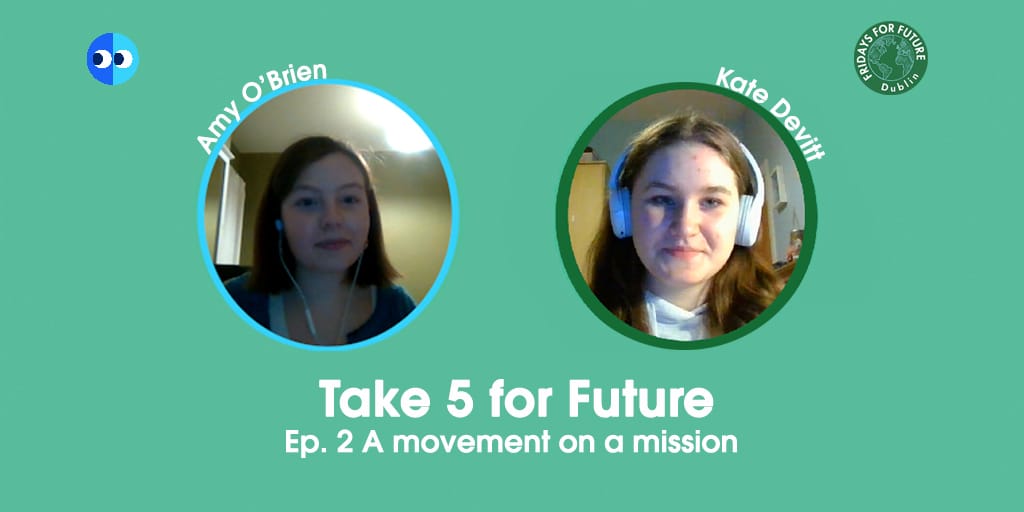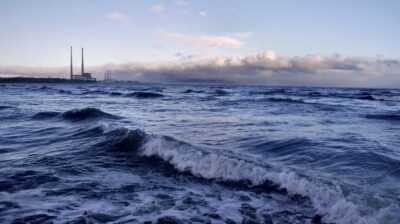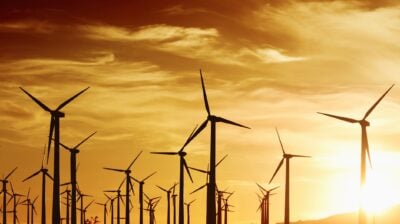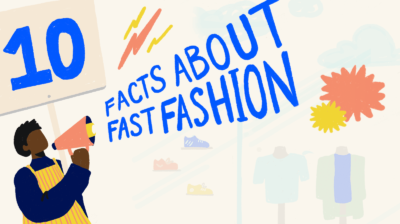Take 5 for Future: A movement on a mission
This week, spunout volunteer Amy O’Brien chats with Kate Devitt from Friday’s for Future Dublin about the group’s goals in the lead up to the #PreserveNotPollute protest in Dublin on March 25th.

spunout and FFF Dublin present ‘Take 5 for Future’, a weekly five-minute-long podcast discussing the importance of the #PreserveNotPollute Global Climate Strike happening in Dublin on March 25th. You can be a part of the movement to #PreserveNotPollute. Follow Fridays for Future Dublin on Instagram and send them a message for more information on how to get involved.
Take 5 for Future Episode 2 Transcript
Amy O’Brien
My name is Amy O’Brien. I use she/her pronouns and I am a 16 year old climate justice activist from Cork. As you know from last week, at ‘Take 5 for Future.’, we are getting ready for March 25th with Fridays for Future Dublin. Today I’m chatting to Kate Devitt from FFF Dublin. So what do you think is the purpose of striking?
Kate Devitt
Yeah. So in my mind, the purpose of striking is to kind of show support for each other because I know it can often be quite daunting sitting on your own, but being out on the streets with hundreds of other activists who are also passionate about climate activism and showing the government that there are hundreds of young people willing to sacrifice their really valuable education or their employment to show their opposition to their policies.
Kate Devitt
I think that’s such a valuable tool that we can use to try and fight for climate action.
Amy O’Brien
Absolutely and I think especially in Ireland we’ve seen striking bring climate change to the fore of government policy and just the public’s mind as well. Brilliant. So Kate, could you tell us a bit about the goals of Fridays for Future Dublin?
Kate Devitt
Yeah, so Fridays for Future Dublin has kind of three different strands of goals so that would be a fossil fuel-free future, a livable city and a just society. So all of the kind of sets are very interconnected like everything is within climate change. And so within kind of a fossil-free future, we have firstly ending all fossil fuel infrastructure, which would mean stopping the building of all like gas plants and stuff, which is recent quite an issue in the media and stopping massive big fossil fuel projects like Shannon LNG. Committing to subsidise renewable energy infrastructure because obviously, we can’t not everyone can afford to use solar panels and all these new renewable sources of energy. But if we invest the money in subsidising the infrastructure, it means that it’s more affordable and accessible to everyone. And then we also support the introduction of polluters pay carbon tax on companies, which is a bit of an alternative system of taxing people based on carbon emissions
Kate Devitt
that kind of takes the responsibility for the emissions away from the consumer and kind of puts it on to companies and the source where the fossil fuels are coming from. And then we’d also want to achieve to commit full decarbonisation by 2035
Amy O’Brien
Continue that’s really interesting.
Kate Devitt
Yeah. So then the second kind of strand of our goals is a livable city. So this would mean that we would make Dublin City walkable and accessible by public transport on top of other things. So this means not only are we increasing the well-being of the citizens, but also making it a more sustainable and Green City. So this is things like increasing the provision of green spaces.
Kate Devitt
So these are areas within the kind of otherwise concrete jungle of a city that not only provide places of recreation for the inhabitants but also mean that we get to get places of rich biodiversity within our city. And we’d also want to increase the rate and span of pedestrianisation, which would obviously remove some congestion, which is awful for the CO2 emissions and less traffic, that kind of thing.
Kate Devitt
And one of the most important things in terms of Dublin City itself is transforming Dublin’s transport into a green fleet. So that would be free, fast and green because we’re obviously going to try to encourage people to use public transport as we move away from using cars and stuff, things that are high emissions. And so we’d want it to be free and accessible.
Kate Devitt
Obviously, it’s not going to be effective if we have one bus going every hour. And then finally, kind of just the more general things adding more public amenities. So this would be like bins for littering and benches and drinking stations and such. And then and then the last kind of strand is a just society. So this is the idea of tying climate justice in with everything we do and wanting a just transition so that everyone is supported as we move to a more sustainable and green future.
Kate Devitt
And so the first thing in that would kind of be to support farmers and to transition to more sustainable practices. And I know often in Irish media, it’s pitted as climate activists against farmers, but really that’s not it at all. We’re trying to kind of move with them and subsidise and provide finance so that they can transition and not feel like they are the ones being targeted by the new policies.
Kate Devitt
Along with the kind of idea of a just transition, we want to avoid putting the onus on consumers, which is again, stuff I mentioned like the polluters pay carbon tax. That would mean that it’s not really a responsibility of the individual, obviously, there is some kind of independent action needed if we are to achieve proper good climate action,
Kate Devitt
but kind of taking away this idea of a carbon footprint and kind of looking at it from the source. Then we’d also kind of be wanting to advocate for human rights within the EU and such not exploiting ‘MAPA’ the most effective people and areas, which is obviously has been a real issue in the past and ending things like Direct Provision, which again is kind of seen like it’s disconnected from the climate activism sphere, but really it’s all really interconnected.
Kate Devitt
and often we will be getting so many climate refugees in the next 20, 30, 40 years that we need to have strong ways as a country that isn’t going to be and massively affected as we are already seeing countries like the Philippines and stuff being affected by typhoons and stuff. And then so we’d want to legislate for the climate rights and provide acceptance of climate refugees to kind of tie in with that.
Kate Devitt
And then finally we were in favour of implementing strong education for sustainable development in schools because obviously how are we expecting teenagers and children to transition to a more sustainable future if they have no idea what it’s about?
Amy O’Brien
Amazing. So sounds like a just transition is really like at the fore of all of this. Amazing. So as of every episode, we’re going to end with the fact to continue equipping ourselves to achieve climate justice. So Kate what is today’s fact?
Kate Devitt
So today’s fact is that in just under two weeks from the release of this episode, we’re close to it, the 15th of March, is the three year anniversary of the first climate strike in Dublin. So the upcoming strike is very close to three years, meaning that we’re obviously seeing that we need climate action after three years just as much as we needed it three years ago, if not more.
Amy O’Brien
Well, that is such like it’s an exciting fact. But also, as you said, there’s a lot of lessons to take away from that. Thank you so much to everyone for listening to Take Five for Future and to Kate for chatting to us. And I hope you have learned even more and are getting excited for March 25th. So remember, you can go follow @FridaysForFutureDublin and DM them to get involved.






